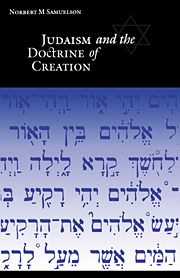Book contents
- Frontmatter
- Contents
- Preface
- Introduction
- PART 1 THE MODERN DOGMA OF CREATION
- PART 2 A JEWISH VIEW OF CREATION
- PART 3 THE FOUNDATIONS FOR THE JEWISH VIEW OF CREATION
- Chapter 5 The account of creation in Genesis
- Chapter 6 The account of the origin in Plato's Timaeus
- PART 4 A BELIEVABLE VIEW OF CREATION
- Notes
- Select bibliography
- Indices
Chapter 6 - The account of the origin in Plato's Timaeus
Published online by Cambridge University Press: 08 January 2010
- Frontmatter
- Contents
- Preface
- Introduction
- PART 1 THE MODERN DOGMA OF CREATION
- PART 2 A JEWISH VIEW OF CREATION
- PART 3 THE FOUNDATIONS FOR THE JEWISH VIEW OF CREATION
- Chapter 5 The account of creation in Genesis
- Chapter 6 The account of the origin in Plato's Timaeus
- PART 4 A BELIEVABLE VIEW OF CREATION
- Notes
- Select bibliography
- Indices
Summary
Israelite priests, living in exile in Babylonia, wrote an epic myth that made coherent their lived experience of national destruction and their belief that what they did as priests was the most important activity in the universe. The myth itself placed their personal collective experience into a philosophical/scientific/theological causal framework that applied to absolutely everything – astronomy, physics, history, politics, ethics, etc. In forming their view of the cosmos they drew on what they knew as the best science of their day – that of sixth-century b.g.e. Babylonia. However, subsequent generations of Jews long lost any memory of the original sources that informed the author(s) of scripture. For many generations the revived nation had little interest in the scientific-philosophic component of their foundation text. However, as earlier generations sought through commentary to recapture the details of the legal parts of the Torah, post-ninth-century c.e. rabbis attempted to draw out of the words of Genesis the implicit philosophy and science of the text. In so doing they needed to reconstruct the text's underlying cosmology. As we have seen, they did so in terms of the cosmology and cosmogony in Plato's Timaeus. Clearly, this Greek text was unknown to the author(s) of Genesis. Similarly, we today know little if anything of the scientific framework of Genesis in sixth-century b.g.e. Babylonia. However, we can judge, solely on the evidence of what we do know – viz., the inherited texts of both Genesis and the Timaeus – how coherent the two cosmologies are.
- Type
- Chapter
- Information
- Judaism and the Doctrine of Creation , pp. 167 - 198Publisher: Cambridge University PressPrint publication year: 1994



